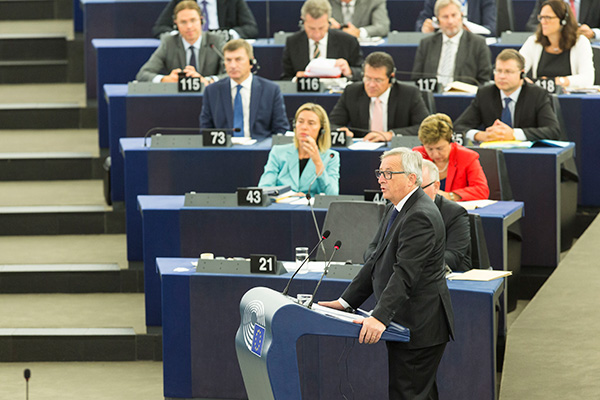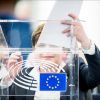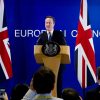Theme1
How is the new European Commission, led by Jean-Claude Juncker, facing up to the numerous crises that are besetting the EU?
Summary
Jean-Claude Juncker took office as President of the European Commission almost two years ago. The balance to date has been overshadowed by a string of crises that have called into question the viability of the European project itself.
Analysis
On 15 July 2014, following a vote in the European Parliament in which he won the backing of 422 of the 751 Euro MPs, Jean-Claude Juncker became the President of the European Commission. He succeeded his Portuguese predecessor, José Manuel Durão Barroso, who had led the European executive for two consecutive terms.
Who is Juncker and how did he come by the Presidency of the Commission? The protagonist of this tale is a Luxembourger with a lengthy career both in his own country and in the EU’s institutions. The Christian Democrat was Finance Minister of Luxembourg for 20 years, Prime Minister for almost 20 years and President of the Eurogroup for around a decade.
Juncker ran in the European People’s Party’s primaries and beat Michel Barnier, at that time the Commissioner holding the powerful Internal Market portfolio. He then embarked upon an electoral campaign in which it was said that what Juncker really wanted was not to obtain the Presidency of the Commission, a position that requires a good deal of day-to-day work, but something of a more symbolic nature for this final phase of his political career, such as the Presidency of the European Council. This post, with fewer powers and less room for manoeuvre, finally fell into the hands of the former Polish Prime Minister, Donald Tusk.
Some months prior to Tusk taking the reins at the European Council, and against the background of serious economic crisis and the electorate’s disenchantment with the European project, there were elections to the European Parliament. The results of the votes cast in May 2014 confirmed the opinion pollsters’ direst predictions: the forces of Europhobia won in countries as important as France and the UK. It was an historic moment, in which those opposed to the common European project had more power than ever in the European institution par excellence, the European Parliament.
Juncker, the elections’ clear winner, viewed the situation with concern. Along with his German colleague, Martin Schulz, he decided to implement a strategy aimed at counteracting the poor image of Europe’s institutions. Both therefore took the decision to create an alliance comprising all the spitzenkandidaten (candidates to the Presidency of the Commission nominated by the various parliamentary groups), who endorsed Juncker’s right to try to garner the support of the European Parliament and in the process become the new President of the European executive.
This moment marked a key turning point, because when the spitzenkandidaten closed ranks they secured a clear victory against another European institution, the European Council, where there were those who argued that the task of electing the President of the Commission continued to be the prerogative of the European Council. Once Angela Merkel had overcome her doubts regarding Juncker and the process, opponents of allowing the electoral results to determine the Presidency of the Commission were left isolated, particularly the British Premier,David Cameron, who was only able to secure the backing of the controversial Hungarian Prime Minister, Viktor Orbán.
The victory had two fundamental consequences. First, a precedent was set in the process of European integration. This means that from now on it will be extremely difficult for the Presidents of the Commission not to be indirectly elected via the results of the European parliamentary elections. Numerous ideas have been floated with the aim of lending importance to European elections, traditionally viewed as ‘secondary’, and it remains to be seen what decisions are taken in this regard, but it seems clear that the European Council has lost its capacity to veto the President of the Commission.
Secondly, a significant institutional innovation has occurred, namely an attempt to turn the European Parliament into a chamber that functions like national legislative assemblies, in the sense that the Commission –in its role as the European executive– has the support of the Parliament to carry out its initiatives. To ensure the smooth running of this institutional innovation an informal coordination structure has been set up that normally meets on a weekly basis and has taken the name –also informal– of the ‘G5’. This comprises Juncker and Frans Timmermans, representing the Commission, and Schulz, Gianni Pittella and Manfred Weber, on behalf of the Parliament. The latter are respectively the President of the Parliament, the leader of the European socialists and the leader of the European People’s Party. It therefore consists of a clear commitment to a twofold ‘grand coalition’: a coalition between the Commission and Parliament, and between the European People’s Party and the European Socialist Party in the Parliament itself, side-lining the liberals, greens and other groups.
Highs and lows of a tumultuous start
From the outset Juncker declared that he wanted a much more political Commission, one whose goal would be to enact one of the institution’s classic mantras: to be ‘big in the big things and small in the small things’. With this objective of better regulation, 23 initiatives were set in train over the course of 2015, compared with an average of 130 per year between 2010 and 2014. By the same token, no fewer than 80 measures were withdrawn in 2015, whereas the 2010-14 period saw an annual average of 26 withdrawals. The Commission has focused on prioritising 10 key strands that will guide its efforts throughout its term in office: (1) a new boost for jobs, growth and investment; (2) a connected digital single market; (3) a resilient Energy Union with a forward-looking climate-change policy; (4) a deeper and fairer internal market with a strengthened industrial base; (5) a deeper and fairer Economic and Monetary Union; (6) a reasonable and balanced free-trade agreement with the US; (7) an area of justice and fundamental rights based on mutual trust; (8) a new policy on migration; (9) becoming a stronger global actor; and (10) a Union of democratic change.
Despite his ambitious proposals, Juncker has run up against a more fraught reality, one that has brought one crisis after another and, if anything, throws the question of the sustainability of the project into even starker relief, particularly when national interests undermine the prospects for finding solutions to the crises.
The first of these crises could have cost Juncker his job. This was the LuxLeaks scandal, which broke out in November 2014 amid claims that Juncker was aware of practices –ethically questionable, to say the least– at the time he held government office in Luxembourg. The President of the Commission’s credibility fell to extremely low levels, but he managed to avoid the no confidence motion being mooted against him by promising to sponsor European changes that would forestall the prospect of similar events befalling the EU. In this respect, on 8 October, the European Commission launched a public consultation to promote a Common Consolidated Corporate Tax Base in the EU.
The crisis rapidly abated, but not so the one that loomed throughout the first half of 2015: the growing possibility that Greece would leave the euro. With the coming to power of Syriza at the start of 2015, the negotiations between creditors and debtors became increasingly fraught, to such an extent that they reached a situation of deadlock following a highly risky showdown between EU partners. The Greek government resorted to calling and winning a referendum that led it, perversely, to accepting worse conditions for a third bailout than those offered by its creditors in the first instance.
The outcome of the Commission’s work in the Greek crisis was ambiguous. It is true that it managed to avoid the real possibility of Grexit, and that Juncker played a very active role in the negotiations, sitting at the same table all the key players involved, including the Director General of the International Monetary Fund (IMF), Christine Lagarde, the Governor of the Central European Bank, Mario Draghi, and the President of the Eurogroup, Jeroen Dijsselbloem. Furthermore, certain beneficial measures were included in the package of conditions, such as assessing the social impact of the steps to be taken and the modernisation of the Greek administration. The perception that a member of the club had been humiliated gained currency around the world, however, something that took its toll on the EU’s reputation.
The most problematic item to have landed in Juncker’s in-tray to date has been the refugee crisis. There is a striking lack of an EU-wide asylum system, something that has been a fundamental impediment to tackling an issue member states have viewed with alarming short-sightedness, beset by a belief that there could really be a national solution in erecting fences to halt the inflows of people fleeing their home countries (Syria, Afghanistan, Eritrea, Pakistan and the like).
Between May 2015, when proposals were made to help Italy and Greece by resettling 40,000 people in other member states, and September, when a more ambitious request was tabled by the European Commission (involving the resettlement of 120,000 refugees), a genuine human catastrophe unfolded. This elicited a limited joint response only when images of the little Syrian refugee Aylan, drowned on a tourist beach in Turkey, appeared in all the news media. Since then the Commission has worked to turn the resettlement agreement into reality and sought ways of halting the inflows. To this end it has negotiated an agreement with Turkey, it has doubled emergency funding to help the member states most affected and has tabled a permanent relocation mechanism, among other measures.
Looking beyond these crises, which have called for an EU-wide response, notable progress has been made on the areas identified as priorities. These include the launch of the first projects under the so-called ‘Juncker Plan’, which aims to release €315 billion over three years; the definitive elimination of mobile roaming charges by 2017, the improvement of interconnections with the Iberian Peninsula and the Baltic, headway towards a Capital Markets Union, the endorsement of the Five Presidents’ Report, the progress made in negotiating the Transatlantic Trade and Investment Partnership (TTIP) with the US, the submission of the European Security Agenda for 2015-20, the resettlement proposals for asylum seekers, the proposal of the creation of a EU border guard corps, a key role in the agreement reached on the Iranian nuclear programme and the improvement of the EU transparency register.
Spain and the Juncker Commission
Given that the Luxembourg politician was the candidate representing the European People’s Party, Mariano Rajoy’s government was gratified by Juncker’s election as President. However, this affinity was not sufficient to secure an appointment to what are widely regarded as the front-rank posts among the Commissioners, and Miguel Arias Cañete had to make do with the Climate Action and Energy portfolio. In the new reorganisation of the European Commission (divided into project-focused teams working on separate floors at Berlaymont, the Commission’s headquarters), Arias Cañete reports to one of the Vice-presidents, Maros Sefcovic, head of the Energy Union portfolio.
The results have not been overly negative, however, bearing in mind the visibility he achieved at COP21 (held from 30 November to 11 December 2015 in Paris) and the Spanish interest in energy interconnections, particularly when set against the longstanding neglect of the Iberian Peninsula in this area. The headway being made on the Energy Union is thus being closely monitored by Commissioner Arias Cañete and by the Spanish government itself.
Meanwhile, the acknowledged need for greater investment to improve the macroeconomic outlook, without side-lining the issues of fiscal responsibility and structural reforms, is also something that benefits Spain, with its pressing need to focus on reducing unemployment and adjust itself to its deficit and public debt targets. This, which would have been a lifeline for Spain some time ago, is still welcome now. In this context it is particularly worth highlighting the importance of the Juncker Plan and the greater flexibility in applying the regulations of the Stability and Growth Pact.
In the economic sphere there is another issue in which Spain has shown considerable interest: the successful conclusion of the TTIP, for which 11 negotiating rounds have been held so far. It so happens that the chief negotiator for the EU is a Spaniard, Ignacio García Bercero, but quite apart from this the Spanish administration has expressed great support for the success of the negotiations –just like countries such as the UK, traditionally staunch supporters of signing trade deals– and especially for an agreement with clear geopolitical implications.
It should be borne in mind that although he tries to conceal it for strategic reasons, Juncker is a pro-European convinced of the need to face shared challenges with common policies; this entails greater integration, something that not all member states are prepared to countenance. If there is one country where the elite (and the majority of its citizens) is committed to the European project, that country is Spain, strikingly devoid of any Eurosceptic parties with representation in parliament. The December elections have not changed much in this respect, as both Ciudadanos and Podemos (two emerging forces that have gained numerous seats in the Congress) are pro-European parties, although the latter is more critical of several steps taken by the EU in some topics, such as the refugee crisis.
Spain therefore has the potential to become a useful ally to the Juncker Commission’s way of working. It would be advisable in this regard to increase proactivity in the European debate, as the Spanish government did with the report published on 2 June 2015 calling for the creation of a Eurozone Minister of Finance, a more ambitious proposal than that put forward by Juncker in the Five Presidents’ Report, written jointly with Tusk, Dijsselbloem, Draghi and Schulz.
Another area to which Spain can make a contribution is migration. Spain is the only European country with a land border with Africa and it therefore has the utmost interest in developing a common policy in the most far-reaching terms. Prompted by the arrival of hundreds of thousands of people at Europe’s borders, escaping not only from civil wars but also from unsustainable socioeconomic situations, the EU is carrying out an in-depth examination of Spain’s response to the crisis it endured in the first decade of the 21st century, when it signed repatriation agreements with various sub-Saharan countries.
Conclusions
What legacy does Juncker wish to bequeath?
Juncker is an odd President. Apart from greeting various heads of state and government leaders at the Riga Summit with hugs and kisses, he is liable to call attention to himself by sending (and making public) a letter to his Commissioners requesting that they attend the weekly meetings of the Commission, emphasising that ‘absences should be limited to exceptional and justifiable circumstances’.
He has the clear intention of leaving his mark on the Commission, both in terms of its substance and its operating methods. Apart from the founding fathers, very few politicians have managed to achieve this since work on constructing the European project began. Among their number is one towering figure: Jacques Delors. Since he stepped down from high European office, many have held the Presidency of the Commission without exhibiting a similar level of charisma, let alone the same level of success.
In order to attain his goal Juncker must confront a set of circumstances that is far from propitious. As soon as he entered office he ran into the fact that the economic crisis had already altered the delicate balance of institutional powers, arming the European Council –and especially, but not exclusively, Germany– with much more power and restricting the Parliament’s and the Commission’s room for manoeuvre.
The President of the Commission wishes to reactivate his institution politically and put an end to the ‘business as usual’ approach. His policy priorities document and his working agenda, both for 2015 and for 2016, show this shift of direction in operational terms. As far as his legacy is concerned, however, the level of ambition will probably have to be trimmed given the landscape of continual crisis the EU is having to traverse. It will be a success if he simply ensures that the project does not founder. And the risk is not insignificant: it was conspicuous in the Greek crisis and will be evident again in the months ahead with the British and their ongoing Brexit saga.
The potential departure of member states adds to an economic crisis that has still not been overcome, the growing strength of Eurosceptic parties (in 2017 there are presidential elections in France and the victory of Marine Le Pen cannot at present be ruled out) and a refugee crisis that threatens to sweep before it one of the EU’s most highly-valued achievements: the Schengen area.
This, of course, was not the scenario Juncker imagined on taking the reins at the Commission. Even if his diagnosis in this year’s State of the Union address proves to be correct –‘more Europe is needed in the Union and more union in the EU’– the circumstances will have to change a great deal before he can put his plans into practice. If Juncker succeeds in pulling the European project back from the brink, he will have good grounds for congratulating himself. Being a new Delors is a tall order indeed.
Salvador Llaudes
Research Assistant, Elcano Royal Institute | @sllaudes
1 This analysis was previously published in Spanish in Política Exterior.



